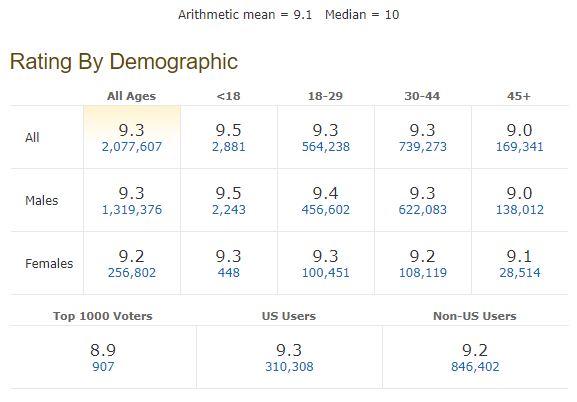IMDb, Rotten tomatoes, Metascore : what does a Score on these Review aggregators actually mean ? whom do you trust the most ?
Published On: 26 April 2019 | Hollywood | By: Ravi Mondeti
Ever wondered the Same movie having a contrastingly different score on each of above-mentioned review aggregators? How these scores differ when they are gathered from the same audience? Moreover knowing the basis on which these Review aggregators calculate their scores will indeed make our choices more certain!


A review aggregator is a system that collects reviews of products and services (such as films, books, video games, software, hardware, and cars). This system stores the reviews and uses them for purposes such as supporting a website where users can view the reviews, selling information to third parties about consumer tendencies, and creating databases for companies to learn about their actual and potential customers.
so the aggregators themselves don't have much say in the reviews but they collate the reviews of individuals worldwide. what they do have a say upon is how they collate this data. let's introspect these Review aggregators.
IMDb(Internet Movie Database)
is an online database of information related to films, television programs, home videos and video games, and internet streams, including cast, production crew and personal biographies, plot summaries, trivia, and fan reviews and ratings. An additional fan feature, message boards, was abandoned in February 2017. Originally a fan-operated website, the database is owned and operated by IMDb.com, Inc., a subsidiary of Amazon. As of October 2018, IMDb has approximately 5.3 million titles (including episodes) and 9.3 million personalities in its database, as well as 83 million registered users.
All the registered members of IMDb can cast their votes/ratings for any movie. IMDb takes all the individual votes cast by the registered users and uses them to calculate a single rating. But, they don’t use the arithmetic mean or median of the votes to get the final rating. The rating displayed on a movie's page is a weighted average rating. Though some of the websites claim that they know how the weighted average of IMDb works, IMDb itself has never given out the method that they use for the fear of it being manipulated. They state on their website that they use the same method for all the movies without any bias so that the ratings are fair.
In case, someone wants to know the mean/median rating of a movie, the breakdown of the voting pattern is also provided by IMDb.

Although they have provided the formula they use to calculate rating for top 250 movies in FAQ section of their website
The following formula is used to calculate the Top Rated 250 titles. This formula provides a true 'Bayesian estimate', which takes into account the number of votes each title has received, minimum votes required to be on the list, and the mean vote for all titles:
weighted rating (WR) = (v ÷ (v+m)) × R + (m ÷ (v+m)) × C
Where:
R = average for the movie (mean) = (rating)
v = number of votes for the movie = (votes)
m = minimum votes required to be listed in the Top Rated list (currently 25,000)
C = the mean vote across the whole report
Rotten Tomatoes
is an American review-aggregation website for film and television. The company was launched in August 1998 by three undergraduate students at the University of California, Berkeley: Senh Duong, Patrick Y. Lee, and Stephen Wang. The name "Rotten Tomatoes" derives from the practice of audiences throwing rotten tomatoes when disapproving of a poor stage performance. Since January 2010, Rotten Tomatoes has been owned by Flixster, which was in turn acquired by Warner Bros. in 2011. In February 2016, Rotten Tomatoes and its parent site Flixster were sold to Comcast's Fandango. Warner Bros. retained a minority stake in the merged entities, including Fandango.
Rotten Tomatoes staff first collects online reviews from writers who are certified members of various writing guilds or film critic-associations. To be accepted as a critic on the website, a critic's original reviews must garner a specific number of "likes" from users. Those classified as "Top Critics" generally write for major newspapers. The critics upload their reviews to the movie page on the website and need to mark their review "fresh" if it's generally favourable or "rotten" otherwise. It is necessary for the critic to do so as some reviews are qualitative and do not grant a numeric score, making it impossible for the system to be automatic.
The website keeps track of all the reviews counted for each film and calculates the percentage of positive reviews. Major, recently released films can attract more than 400 reviews. If the positive reviews make up 60% or more, the film is considered "fresh", in that a supermajority of the reviewers approve of the film. If the positive reviews are less than 60%, the film is considered "rotten". An average score on a 0 to 10 scale is also calculated. With each review, a short excerpt of the review is quoted that also serves a hyperlink to the complete review essay for anyone interested to read the critic's full thoughts on the subject.
To receive a Certified Fresh rating a movie must have a steady Tomatometer rating of 75% or better. Movies opening in wide release need at least 80 reviews from Tomatometer Critics (including 5 Top Critics). Movies opening in limited release need at least 40 reviews from Tomatometer Critics (including 5 Top Critics). A TV show must have a Tomatometer Score of 75% or better with 20 or more reviews from Tomatometer Critics (including 5 Top Critics). If the Tomatometer score drops below 70%, then the movie or TV show loses its Certified Fresh status. In some cases, the Certified Fresh designation may be held at the discretion of the Rotten Tomatoes editorial team.
Metacritic
is a website that aggregates reviews of media products: films, TV shows, music albums, video games, and formerly, books. For each product, the scores from each review are averaged (a weighted average). Metacritic was created by Jason Dietz, Marc Doyle, and Julie Doyle Roberts in 1999. The site provides an excerpt from each review and hyperlinks to its source. Colour of green, yellow or red summarizes the critics' recommendations. It has been described as the video game industry's "premier" review aggregator
Metascore is a weighted average in that they assign more importance, or weight, to some critics and publications than others, based on their quality and overall stature. In addition, for music and movies, they also normalize the resulting scores (akin to "grading on a curve" in college), which prevents scores from clumping together. Metascores range from 0-100, with higher scores indicating better overall reviews. They highlight Metascores in three colors so that you can instantly compare: green scores for favorable reviews, yellow scores for mixed reviews, and red scores for unfavorable reviews.Metacritic designates a movie as "Must-See" when it achieves a Metascore of 81 or higher and has been reviewed by a minimum of 15 publications. "Must-See" movies are highly acclaimed and have been reviewed by a broad cross-section of the best critics. In total, approximately 5% of movies in Metacritic's database achieve this elite status. "good" METASCORES are coded in green; "average" METASCORES are yellow, and "bad" METASCORES are red.

Meet the author
Cinephile and an aspiring Storyteller. Sharing my views and experiences (before and after watching a Movie) in this Space. Believes in Alfred Hitchcoc's principle of three things that can make a Great Movie - The Script ,The Script and The Script.








